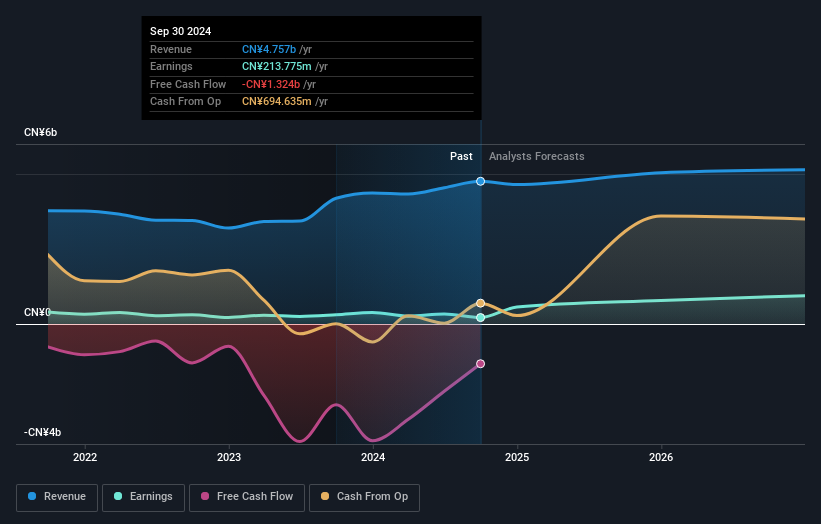- China
- /
- Renewable Energy
- /
- SHSE:601778
Individual investors are Jinko Power Technology Co., Ltd.'s (SHSE:601778) biggest owners and were hit after market cap dropped CN¥455m

Key Insights
- Significant control over Jinko Power Technology by individual investors implies that the general public has more power to influence management and governance-related decisions
- The top 25 shareholders own 50% of the company
- Institutional ownership in Jinko Power Technology is 13%
To get a sense of who is truly in control of Jinko Power Technology Co., Ltd. (SHSE:601778), it is important to understand the ownership structure of the business. And the group that holds the biggest piece of the pie are individual investors with 50% ownership. Put another way, the group faces the maximum upside potential (or downside risk).
And following last week's 4.5% decline in share price, individual investors suffered the most losses.
Let's delve deeper into each type of owner of Jinko Power Technology, beginning with the chart below.
View our latest analysis for Jinko Power Technology

What Does The Institutional Ownership Tell Us About Jinko Power Technology?
Many institutions measure their performance against an index that approximates the local market. So they usually pay more attention to companies that are included in major indices.
As you can see, institutional investors have a fair amount of stake in Jinko Power Technology. This can indicate that the company has a certain degree of credibility in the investment community. However, it is best to be wary of relying on the supposed validation that comes with institutional investors. They too, get it wrong sometimes. It is not uncommon to see a big share price drop if two large institutional investors try to sell out of a stock at the same time. So it is worth checking the past earnings trajectory of Jinko Power Technology, (below). Of course, keep in mind that there are other factors to consider, too.

Hedge funds don't have many shares in Jinko Power Technology. Jinko New Energy Group Co., Ltd. is currently the largest shareholder, with 24% of shares outstanding. Meanwhile, the second and third largest shareholders, hold 4.9% and 4.1%, of the shares outstanding, respectively.
Our studies suggest that the top 25 shareholders collectively control less than half of the company's shares, meaning that the company's shares are widely disseminated and there is no dominant shareholder.
While studying institutional ownership for a company can add value to your research, it is also a good practice to research analyst recommendations to get a deeper understand of a stock's expected performance. There is a little analyst coverage of the stock, but not much. So there is room for it to gain more coverage.
Insider Ownership Of Jinko Power Technology
The definition of an insider can differ slightly between different countries, but members of the board of directors always count. The company management answer to the board and the latter should represent the interests of shareholders. Notably, sometimes top-level managers are on the board themselves.
Most consider insider ownership a positive because it can indicate the board is well aligned with other shareholders. However, on some occasions too much power is concentrated within this group.
Our data cannot confirm that board members are holding shares personally. It is unusual not to have at least some personal holdings by board members, so our data might be flawed. A good next step would be to check how much the CEO is paid.
General Public Ownership
The general public, mostly comprising of individual investors, collectively holds 50% of Jinko Power Technology shares. This size of ownership gives investors from the general public some collective power. They can and probably do influence decisions on executive compensation, dividend policies and proposed business acquisitions.
Private Company Ownership
We can see that Private Companies own 35%, of the shares on issue. It's hard to draw any conclusions from this fact alone, so its worth looking into who owns those private companies. Sometimes insiders or other related parties have an interest in shares in a public company through a separate private company.
Next Steps:
While it is well worth considering the different groups that own a company, there are other factors that are even more important. Like risks, for instance. Every company has them, and we've spotted 3 warning signs for Jinko Power Technology (of which 1 is potentially serious!) you should know about.
If you would prefer discover what analysts are predicting in terms of future growth, do not miss this free report on analyst forecasts.
NB: Figures in this article are calculated using data from the last twelve months, which refer to the 12-month period ending on the last date of the month the financial statement is dated. This may not be consistent with full year annual report figures.
New: Manage All Your Stock Portfolios in One Place
We've created the ultimate portfolio companion for stock investors, and it's free.
• Connect an unlimited number of Portfolios and see your total in one currency
• Be alerted to new Warning Signs or Risks via email or mobile
• Track the Fair Value of your stocks
Have feedback on this article? Concerned about the content? Get in touch with us directly. Alternatively, email editorial-team (at) simplywallst.com.
This article by Simply Wall St is general in nature. We provide commentary based on historical data and analyst forecasts only using an unbiased methodology and our articles are not intended to be financial advice. It does not constitute a recommendation to buy or sell any stock, and does not take account of your objectives, or your financial situation. We aim to bring you long-term focused analysis driven by fundamental data. Note that our analysis may not factor in the latest price-sensitive company announcements or qualitative material. Simply Wall St has no position in any stocks mentioned.
About SHSE:601778
Jinko Power Technology
Operates as an clean energy supplier and service provider.
Proven track record second-rate dividend payer.
Similar Companies
Market Insights
Community Narratives



